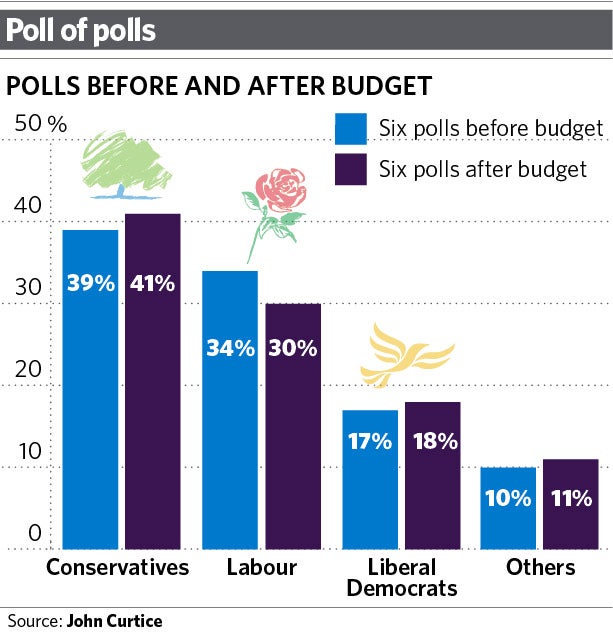Labour slumps to 11-point deficit after Budget

Your support helps us to tell the story
From reproductive rights to climate change to Big Tech, The Independent is on the ground when the story is developing. Whether it's investigating the financials of Elon Musk's pro-Trump PAC or producing our latest documentary, 'The A Word', which shines a light on the American women fighting for reproductive rights, we know how important it is to parse out the facts from the messaging.
At such a critical moment in US history, we need reporters on the ground. Your donation allows us to keep sending journalists to speak to both sides of the story.
The Independent is trusted by Americans across the entire political spectrum. And unlike many other quality news outlets, we choose not to lock Americans out of our reporting and analysis with paywalls. We believe quality journalism should be available to everyone, paid for by those who can afford it.
Your support makes all the difference.There was a dramatic slump in the Labour Party's ratings after last month's Budget, according to the latest "poll of polls" for The Independent.
In the past six surveys before Alistair Darling presented his first Budget on 12 March, the Conservatives (39 per cent) were, on average, five percentage points ahead of Labour (34 per cent). But in the first six polls after the Budget, the lead jumped to 11 points. The Tories averaged 41 per cent, while Labour dropped to 30 per cent.
That would give David Cameron an overall majority if repeated at a general election. The Tories would have 343 MPs, Labour 240, the Liberal Democrats 37 and other parties 30.
"It has been a torrid month for Labour," said John Curtice, professor of politics at Strathclyde University, who compiled the figures. "Labour has suffered since the Budget and it seems to be suffering from the economy."
He said it was the third time in a row that a major Commons statement by Mr Darling had led to a fall in poll ratings. It dropped by two points after his pre-Budget report and by five points after he announced child benefit records on 25 million people had been lost.
On an average of all the polls taken in March by Ipsos MORI, ICM, YouGov, Populus and ComRes, the Tories are on 40 per cent (up one point on February), Labour on 32 per cent (down one), the Liberal Democrats on 18 per cent (up one) and other parties on 10 per cent (down one).
Hitting the 40 per cent mark is crucial to winning an election. The Tories have managed it only three times since the "poll of polls" was launched in 2005, allowing Labour to claim Mr Cameron lacked the momentum of Tony Blair before his 1997 victory.
In March, Labour's rating fell back to its lowest level since Mr Brown became Prime Minister. Labour strategists admit the Budget triggered a downturn because it put the spotlight on the global economic turbulence. Ministers concede that the party needs to "hold its nerve" but insist Labour can recover if Britain emerges in better shape than its rivals.
Mr Brown's personal ratings have also suffered. His net satisfaction rating is at its worst level yet, and dangerously close to Mr Blair's figures in his final months in Downing Street.
Ominously for Labour, the Tories are beginning to pull ahead of it as the party best able to manage the economy. "Labour now faces the real danger that the economy is becoming an issue that works to the Tories' advantage for the first time since 1992," said Professor Curtice.
Join our commenting forum
Join thought-provoking conversations, follow other Independent readers and see their replies
Comments